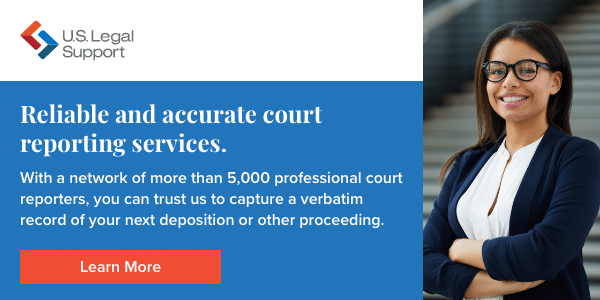Realtime Depositions: Enhancing Legal Proceedings

Nearly 150 years after Miles Bartholomew introduced the first shorthand machine, the various technologies and tools utilized to record court proceedings and legal matters continue evolving.1 Today, realtime deposition capabilities demonstrate the ongoing impact of these innovative developments.
What does a “realtime deposition” mean with regards to the requirement to file “an exact transcript of questions asked and answered” into U.S. court records first became enshrined in 1892?2 Here, we’ll examine how technology enables the realtime transcription of depositions into standard, easily readable language along with similar (near) realtime capabilities adopted by the U.S. legal system.
What is a Realtime Deposition?
The term realtime deposition is something of a misnomer, as most depositions already occur in real time. Transcribing testimony or statements into text—whether done in-person or digitally—generally occurs while experts, witnesses, or any other relevant parties are deposed.
Traditionally, however, deposition transcripts couldn’t be provided in real time to judges, attorneys, or other court officials because stenographers utilize shorthand to keep up with proceedings as they record them. That’s why variations of asking “Could you please read back to the court…,” remain such common lines of dialogue in fictionalized court cases.
The stenographer was the only person in the room who could read the record until they fully transcribed and officially submitted it after the proceeding concluded.
So, realtime depositions specifically refer to the more recent technology integrations that allow a stenographer to record proceedings in their shorthand while computer-assisted transcription translates that shorthand back to English (or another language) for immediate, easy reading by everyone present.3
Benefits of Realtime Deposition for Legal Professionals
Realtime deposition benefits legal professionals in three major ways: it increases the accuracy of testimonies, provides faster access to transcripts, and greatly improves accessibility for anyone who may be deaf or otherwise face difficulty following proceedings.
Increased Accuracy in Testimonies
During a realtime deposition, lawyers and other legal professionals can access, search, and review their own copies of the “rough” transcripts immediately. This better equips them to request clarification, address misstatements, pose follow-up questions, and correct any errors and misunderstandings.
This realtime transcript will still be replaced with a final, official version, but it enables all parties to better perform their duties until then.
Faster Access to Transcripts
When time is of the essence—as it often is in legal proceedings—having instant access to realtime transcript text makes a substantial difference. With more preparation time, lawyers and their support staff organize their strategies and arguments more effectively.
Improved Accessibility for the Deaf, Hard-of-Hearing, or Similarly Disadvantaged
If anyone present in a deposition or other court proceeding struggles to hear what is said, that will likely affect their ability to interpret statements, questions, and other matters significantly. While accommodations such as sign-language interpreters should be provided by the court, stenographers typing and reading back shorthand left little alternatives otherwise. But now, draft transcripts can be provided readily by realtime court reporting services.
As noted by the National Association of the Deaf, realtime transcription—which may also be referred to as Communication Access Realtime Translation (CART)–-can provide readable text via numerous means, including4:
- Computer monitors
- Screened projections
- Video captions
Implementing Realtime in Your Deposition: Key Considerations
Any implementation of realtime deposition technologies involves two crucial considerations: the ongoing role of stenographers and thoroughly training court reporters and legal teams.
Role of Stenographers
Modern technologies like artificial intelligence and transcription software certainly have their place in many industries, but Stenographers play a vital role in court proceedings and likely will for years to come because:
- The need for effectively perfect transcription accuracy means that even with recording software or other technologies, someone must officially verify the realtime reporting transcript and ensure its validity.
- The need for contextual adjustments that accurately reflect proceedings, such as adapting to accents, speech patterns, and other linguistic nuances.
- Courts occasionally require immediate reading back of the “official” record (even in draft form) for judges, attorneys, and other parties.
- It’s imperative that someone requests clarification if parties engage in loud crosstalk, anyone mumbles, or another issue occurs during the time of recording.
Training for Court Reporters and Legal Teams
In the United States, the National Court Reporters Association (NCRA) provides certifications for stenographers and for court reporters who have passed their relevant exam—generally following an educational program with professional training. Anyone interested in realtime court reporting services or stenography career can register for the organization’s foundational Registered Professional Reporter (RPR) test.5
Individuals pursuing NCRA’s certification of their realtime skills can pursue:
- Certified Realtime Reporter (CRR)
- Certified Realtime Captioner (CRC)
Common Challenges and Solutions
Realtime depositions face two common challenges: technical issues and ensuring maximum security and confidentiality. Here’s what you need to know to prevent or address them.
Dealing with Technical Issues
If you work with technology, you know issues are bound to happen. Stenotypes might malfunction; software sometimes crashes or behaves unpredictably.
Should technical issues occur, it is important to stay calm and composed. Identify the problem and see if there is a quick solution—a simple restart often helps. Of course, other participants in the realtime deposition must be informed of the issue as soon as possible so proceedings don’t continue unrecorded.
Requesting a quick recess and contacting technical support is also a good idea if the problem is not going away.
Ensuring Security and Confidentiality
By the nature of their profession, stenographers handle very sensitive information, making confidentiality and security paramount. Out of respect for all parties involved and the legal process itself, stenographers must maintain absolute confidentiality and adhere to ethical standards set by organizations such as the NCRA.6
Confidentiality and security go hand in hand. All data needs to be protected from unauthorized access with appropriate safeguards (e.g., multifactor authentication, secure transfer, routinely updated software). Stenographers should strive to stay current with the latest trends in cybersecurity—with resources like the NCRA’s webinars for professionals proving beneficial.7
Leverage Realtime During Depositions With U.S. Legal Support
With nearly three decades of experience, U.S. Legal Support has a network of more than 5,000 professional court reporters ready to assist with your proceedings – including realtime feeds for both in-person and remote proceedings. To explore how we can help, contact our team.
Sources:
- Stenograph. The History of Writing Machines. https://www.stenograph.com/history-writers
- Amalia D. Kessler. Our Inquisitorial Tradition: Equity Procedure, Due Process, and the Search for an Alternative to the Adversarial. https://scholarship.law.cornell.edu/cgi/viewcontent.cgi?article=3001&context=clr
- Oregon Court Reporters Association. Professional Definitions. https://www.orcra.org/Professional-Definitions
- National Association of the Deaf. Communication Access Realtime Translation. https://www.nad.org/resources/technology/captioning-for-access/communication-access-realtime-translation/
- NCRA. Registered Professional Reporter. https://www.ncra.org/certification/NCRA-Certifications/registered-professional-reporter
- NCRA. NCRA Code of Professional Ethics. https://www.ncra.org/home/the-profession/NCRA-Code-of-Professional-Ethics
- NCRA. Live Webinar – Cybersecurity: What You Need to Know to Protect Your Computer and Online Accounts. https://www.ncra.org/detail-pages/event-detail/2023/10/04/webinars/live-webinar—cybersecurity-what-you-need-to-know-to-protect-your-computer-and-online-accounts
- NCRA. Certified Realtime Reporter (CRR). https://www.ncra.org/certification/NCRA-Certifications/certified-realtime-reporter

Editoral Policy
Content published on the U.S. Legal Support blog is reviewed by professionals in the legal and litigation support services field to help ensure accurate information. The information provided in this blog is for informational purposes only and should not be construed as legal advice for attorneys or clients.


